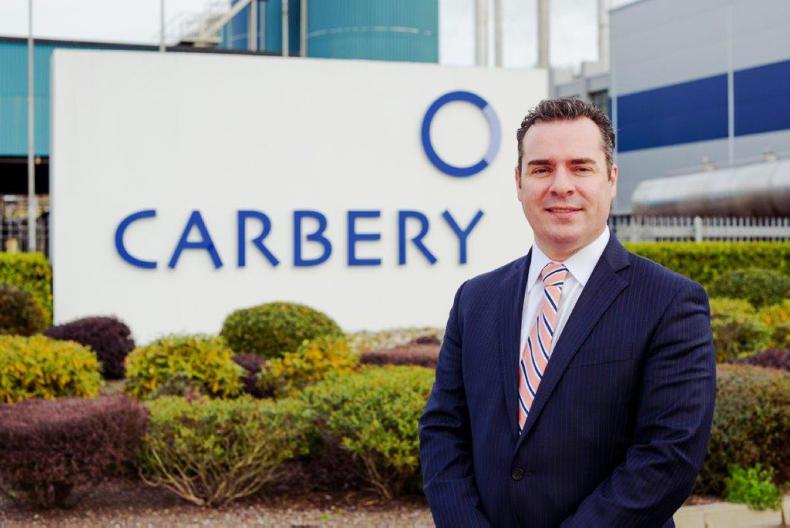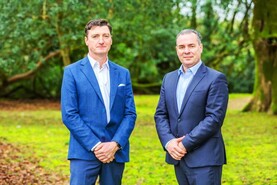Jason Hawkins is the first new leader of Carbery in 25 years. While he joins the group from Dairy Farmers of America (DFA), he began and spent most of his career with the Kerry Group.
The new chief executive says the future is very positive for the Carbery Group. He sees milk supply growth continuing at around 3% per annum. It is already up 31% since the lifting of quotas. While he sees this as a great opportunity with sufficient processing capacity until 2021, Carbery will need to invest to process additional growth in supply beyond that. He also sees potential in harnessing the technical capability in its ingredients and flavours business.
He says his primary focus will be on a cheese diversification strategy and building a strong nutritional strategy.
“This will create flexibility around other cheeses and the capability to expand into new geographies,” according to Hawkins. This could see the group invest further in whey and associated technologies alongside expanding into new geographies.
Having joined the business at the start of this year, he brings with him a new perspective. His background with Kerry Group combined with his experience at DFA make him well suited to build Carbery’s business. He has a wealth of experience in taste, flavours and nutrition, which will benefit all sides of Carbery’s business including its Synergy business in the US.
“I see a large opportunity around a cheese diversification strategy,” says Hawkins. Carbery produces around 50,000t of cheddar annually from its Ballineen factory, accounting for 25% of Ireland’s cheese output. Much of this is destined for the UK market.
“The challenge now is to find the markets that deliver value to our farmer base”. He says the international taste and flavours business (Synergy) is well invested and has the infrastructure in place to grow further. He adds there may be “some opportunistic acquisitions in the future but that they must be at value”.
He is very focused on the development of new valued-added technologies and markets. What most impresses him about the business is the technical capability on nutrition.
“This is a business with potential and can grow,” he adds. He sees the ingredients business moving further up the value chain, producing ingredients at the highest quality to be used in infant formula, ageing nutrition and sports nutrition products.
While Brexit is seen as a risk, the new leader believes that we will look back on Brexit as a positive as it will have accelerated the business to diversify its product portfolio and remove risk from the business. Although this is something the business was always aware of, the timeline of Brexit is concentrating the minds and accelerating the strategy, according to Hawkins.
On dairy outlook, Hawkins says he is “more bullish on price than a month ago”. However, he added: “There is still a correction needed in milk prices here in the short term.”
He believes we will see decent supply in the next two quarters due to cow numbers in Europe. He expects a better supply balance in the latter half of the year which could help to stabilise prices. Overall, he says he is “optimistic that longer-term dairy demand is healthy and that Carbery will continue to create value for shareholders through investment in research and development, new product opportunities and facility expansion to cater for planned growth”.
Concluding, he says: “No one man makes an organisation. There is a very capable leadership team with excellent people in Carbery and that is acknowledged by the success of 2017.”
Hawkins has developed a global ingredients business under the structures of a plc yet also brings the values of a co-op, learned at DFA – one of the largest milk processors in the US, with 30% of the US milk pool.
Under previous CEO Dan MacSweeney’s direction, Carbery did not forget its farmer roots, consistently returning profits through the payment of leading milk prices, much to the envy of many other co-ops.
He takes over at a time when it employs almost 600 people, operates from eight locations globally but under the shadow of Brexit.
No doubt one of the biggest challenges he faces is a hard Brexit as the majority of cheese Carbery produces is destined for the UK market.
If he can successfully diversify the group’s cheese business, it will ensure Carbery continues to pay strong milk prices to its supplying co-ops of Bandon, Barryroe, Drinagh and Lisavaird.
He has big boots to fill. We wish him every success.
Carbery profits rise on back of cheese
The West Cork based co-op, Carbery Group, reported profits (EBITDA) up 13% to €41.8m for the year ended 31 December 2017.
Operating profits increased 15% to €25.5m driven by strong trading performance across all three divisions. Turnover for the year increased 22.7% to €417.3m from €340.0m in the previous year. This is after it paid a 1c/l bonus to milk suppliers at year end.
Milk supplies to Carbery’s processing facility in Ballineen increased 8.2% to 509m litres in 2017.
During the year, Carbery invested a further €17.1m across its global operations. This brings investment in the business over the past five years to a total of €80m.
Net debt at year end reduced by €13.5m to €12.7m. The Carbery Board has allocated €10m into its stability fund at year end to support future milk prices during times of price volatility.
Carbery launched its fourth fixed milk price scheme for its milk suppliers in December 2017.
The dairy business performed well during the year with steady growth in its cheese business, supported by its partnership with Ornua, according to the company.
The nutrition business, which includes a broad range of protein products, also had a positive year driven by volume growth. Carbery’s international taste business, Synergy also had a strong year, according to the company.






 This is a subscriber-only article
This is a subscriber-only article









SHARING OPTIONS: